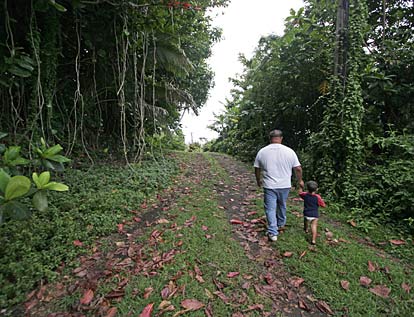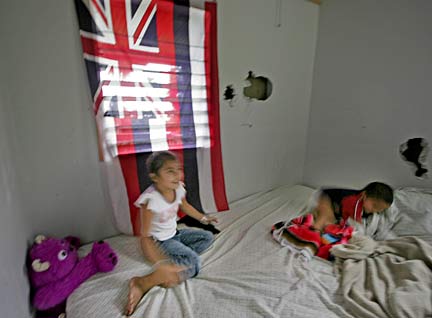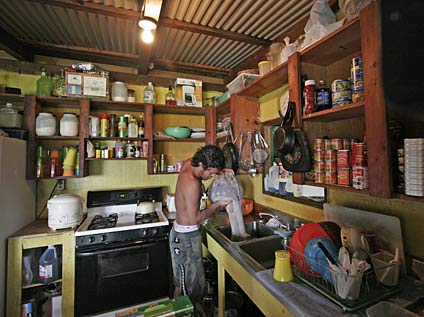|

|
Illegal vacation
rentals make tight
market worse
Neighbor islanders, especially, are
priced out by landlords who solicit
tourists for the homes they used
to rent to long-term residents
HANA, Maui » In an area becoming known for celebrities' real estate deals and high-priced vacation rentals, Patsy Kaina has 15 children and grandchildren under her roof and sees native Hawaiian families like hers being forced out by scarce affordable housing.
|
|
As on Oahu, the housing boom on the neighbor islands has enriched many residents and investors, but it also has threatened the pace and lifestyle of rural areas such as Hana. And the lack of affordable homes has forced some neighbor island workers to endure marathon daily commutes or just leave altogether.
In Maui County, officials encourage tourism and have traditionally directed visitor growth into luxury-destination areas such as Kaanapali and Kapalua in West Maui, and Wailea and Makena in South Maui. But the demand for vacation rentals and bed-and-breakfast inns has spilled over into residential, rural and agricultural areas not zoned for such use. The higher demand has translated into higher home prices, rents and property taxes.
Some Hana residents also have complained about recent celebrity land deals in East Maui.
Oprah Winfrey received a five-year conditional permit in March to operate 12 vacation rental rooms in rural Kula in Upcountry Maui, and, along with her personal trainer, Bob Greene, she has bought 102 acres in remote Hana.
While about four properties are authorized to operate visitor accommodations in Hana, about 80 others are in operation or soliciting tourist rental business illegally on the Internet, according to county and state officials.
Residents, meanwhile, say it is not unusual to find three families living in the same house in Hana, where rental homes are both scarce and expensive -- about $1,000 to $1,300 a month.
"The situation is fairly desperate as far as affordable housing," said Carl Lindquist, broker at Hana Coast Realty Inc.
Kaina said she worries that higher taxes and the lack of affordable housing will push out longtime native Hawaiian residents who comprise the majority of Hana residents.

Kaleo Kaina relaxes on the lanai of his home in Haou, Maui, with his 1-year-old granddaughter, Mahi'e. The home is about five miles from Hana. The area behind him once belonged to the family but has now been taken over by developers. Relatives of the family still live all around the Kainas' home.
Kaleo plays with his grandson Kalaeloa Kaukini, 4 months, after coming home from work. At right is his daughter-in-law Jawn Lono-Kaina, who is holding her son 2-year-old son, Maluhia.
Part of the tradition includes sharing food from the sea with neighbors and also working together to care for a 10-mile network of terraced taro patches irrigated by mountain streams.
Kaina said the communal work teaches her children and grandchildren the value of cooperation and native culture.
"What we're trying to do is to foster the interest and knowledge and pass it down to the younger generation and keep it alive," she said.
For scores of Big Island residents, the housing crunch has meant getting up to catch a 3:30 a.m. bus in Hilo in East Hawaii to work in West Hawaii.
Housing prices in Kohala and North Kona, where construction has focused on resorts and luxury homes, are beyond the income range of most service-industry workers.
Hatnat Meneky, who works as a landscaper at the Mauna Lani Bay Hotel in South Kohala, travels four hours by bus in addition to working an eight-hour day.
He said he earns $13.25 an hour and pays $1,350 in rent for a house in Puna, considerably less than it would cost him in West Hawaii. But he does not like the ride.
"Four hours on the bus is not worth it. I do it because of the money," said Meneky, who has been commuting for two years. "I'm getting tired of it."
Meneky said he would move closer to his work if he could find an affordable place.
Hawaii County transportation administrator Tom Brown said the three buses that leave in the mornings are nearly full, carrying usually more than 40 people, and the numbers are growing.
Brown said there are many houses in West Hawaii but few that are affordable to workers in service-related jobs in resort areas, forcing workers to make the roughly 85-mile commute.
"It's just outrageous, some of these prices," he said.
Housing prices also have contributed to an employment crunch on Kauai, where employers are having difficulty keeping workers for service and agricultural jobs.
Hanalei Poi Co. LLC official Hobey Beck said his business is having trouble retaining workers because of high rents.
"We do have a lot of turnover," he said. "That gets kind of frustrating."
With pay at $10 to $15 an hour, poi workers spend much of their salary for rents that can go for $600 to $800 for a single room in Lihue, about an hour by bus to the business in Hanalei, Beck said. And that is if they can find a rental at all, he added.
In Hanalei, once a community of farm families, the taro patches remain, but virtually all of the residences have been converted into vacation rentals at rates more than four times what workers pay, he said.

Kaleo Kaina walks behind his home with his 2-year-old grandson Maluhia along what was once a stretch of Hana Highway. The old Hana School stood in the wooded area at left.
Two-year-old Maluhia Kaina and his sister Anela, 5, play after Anela came home from school. 
Taina Kaina empties in the kitchen a large bag of opihi he had just picked.
Beck recalled taking his children on Halloween door to door in Hanalei two years ago.
"We went knocking on doors. You couldn't find a resident," he said. "They were vacationers or the vacation houses were empty."
Marilyn Mohler, an official with a Kauai group that helps single parents, recalled a mother of seven children losing her house of 14 years because the owner converted it into a vacation rental.
"They cannot afford these higher rents," said Mohler, of Hui O Na Makua Ho'okahi O Kauai. "It's just a vicious cycle."
Kenneth Rainforth, a Kauai County housing official, said the shortage of affordable homes forces some to leave the island.
"We always come up short; that's why we lose part of each generation," Rainforth said. "They move out to the mainland and don't come back. At times like these, it seems worse."
Hawaii County Housing Administrator Edwin Taira said the lack of rentals on the market is partly due to few apartments being built on the Big Island since the 1970s, as opposed to resort condominiums.
To help solve the problem, neighbor island counties have increased or are looking at increasing the requirement that residential developers set aside a percentage of the units they build for affordable housing.
The Big Island increased the affordable-housing contribution requirement to 20 percent from 10 percent this year; Kauai County has been looking at raising it up to as much as 30 percent from 15 percent; and Maui has raised it to 15 percent from 10 percent.
Kauai County Council Planning Committee Chairwoman JoAnn Yukimura said affordable housing should be integrated into a proposed development to reduce the problem of providing separate roads, sewers and other services.
Yukimura said putting the affordable housing in a development is also economically and socially healthier for the island community.
"We want communities where they live together ... and we don't want to stigmatize the affordable housing," Yukimura said.
Critics note that lax enforcement of zoning laws has also contributed to the housing problem, allowing hundreds to operate bed-and-breakfast and vacation rentals illegally in residential, rural and agricultural areas.
For instance in Maui County, there are 40 authorized bed-and-breakfast businesses, but there are 273 listed on the Internet, according to state and county officials.
Maui County housing director Alice Lee said that illegal vacation rentals have definitely cut into the availability of affordable housing.
Lee said the County Council has been looking at regulating vacation rentals and at providing a partial tax exemption to property owners who rent to residents.
"We're trying to give an incentive to those who currently have a vacant unit or cottage available," she said.
Lee said several developers are planning major projects that include hundreds of affordable units in Central and West Maui and that 14 self-help housing units are planned for Hana.
Kaina said with about 800 households in Hana, many with three families, 14 units barely scratch the surface.
She said the state and county government should make the subdivision of land easier and less expensive for families who want to pass on parcels of their land to their children.
Kaina said her husband's family owns 27 acres of rural land and has been unable to subdivide it because of the development cost, this while paying close to $10,000 a year in taxes on the land.
Kaina said she thinks that the state, which owns land in the Hana District, should provide more opportunity for residential housing, and she has been talking with lawmakers about the need for more affordable housing.
"We're the generation that is fighting for the future, so that when it's the future time they're not getting the problems we're getting," Kaina said.
Tonight on KITV 4 News at 10 ...
[News] [Business] [Features] [Sports] [Editorial] [Do It Electric!]
[Classified Ads] [Search] [Subscribe] [Info] [Letter to Editor]
[Feedback]


